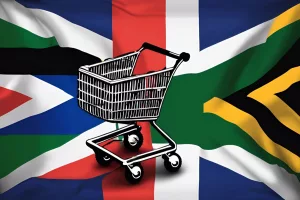In South Africa, a delicious blend of art and commerce is taking shape through a unique collaboration between Stork South Africa and artist Cow Mash. Cow Mash turned Stork’s new butter spread into a stunning sculpture, inviting people to enjoy art not just by looking, but by tasting it too. This project highlights the joy of sharing and community, with the sculpture representing a bowl—a symbol of togetherness in African culture. By merging creativity with everyday products, this partnership shows how art can connect us and create new experiences that celebrate life and culture.
South Africa’s online shopping scene is buzzing with excitement! Takealot is the big boss, with 89% of shoppers loving its offerings. But new players like Temu and Shein are catching up fast, grabbing 40% and 39% of the crowd, respectively. Grocery shopping online is also on the rise, with Checkers Sixty60 leading the way. As more people shop online than ever before, the competition is heating up, promising shoppers even more choices and deals!
The South African Revenue Service (SARS) is making changes to the ecommerce landscape to promote fair competition. Two highprofile Far East businesses, Shein and Temu, have been leveraging the ecommerce atmosphere in South Africa, but SARS’s new policy will overhaul how Customs and Excise handle smallscale orders, which will dramatically influence the pricing structure of these digital storefronts. The change is a counteraction to charges from indigenous South African businesses who allege that Shein and Temu have been manipulating the former law to gain a pricing edge over local retailers.
Amazon has made an exciting move into South Africa with the launch of its online platform, amazon.co.za. The platform offers a wide range of products and promises free nextday delivery on orders over R500. To enhance the customer experience, Amazon has partnered with local courier companies and a South African nonprofit organization, goGOGOgo, to provide realtime updates on orders, easy returns, and handmade gift bags. Amazon’s venture into South Africa offers a ripe opportunity for ecommerce companies, and it affords local sellers, brand proprietors, and entrepreneurs the chance to expand their business with Amazon.
In South Africa, Amazon and local ecommerce giant Takealot are engaged in a battle for supremacy in the rapidly growing ecommerce market, which is projected to reach $72bn within two years. Amazon’s business model, which provides a highly personalized shopping experience, has won over many South African consumers, while Takealot’s existing foothold in the local market has made it a formidable competitor. However, with the launch of Amazon’s South African website imminent, industry experts predict a challenging time for Takealot. The competition between these two ecommerce titans signals a new phase in the South African ecommerce sector marked by intense rivalry and innovation.
Takealot, a popular South African online retailer, has introduced a new ondemand delivery service named TakealotNow. This service promises to deliver products within a onehour timeframe. This innovative service is currently available only in the Northern Suburbs of Cape Town. However, Takealot plans to expand this service throughout the city in the coming months.
The South African Post Office (SAPO) has faced numerous challenges in recent years, including financial difficulties, strikes, and mismanagement of funds, leading to its provisional liquidation. Despite these setbacks, the Minister of Communications and Digital Technologies has reassured the public that efforts are underway to save the entity.







